0Chain, pronounced “zero chain” is a fast, scalable, permissionless blockchain that functions as a data storage network that’s focused on data privacy and data protection. One interesting twist in 0Chain is that unlike other data storage platforms it does not store the data on the blockchain.
This, along with the way 0Chain splits up the workload for storing blocks and reaching consensus yields a lightweight network with faster transaction speeds. If this all sounds interesting you can watch our video that goes into more depth, or simply dig in below as we examine the details behind 0Chain.
About 0Chain
The success of cryptocurrencies has undoubtedly spurred a paradigm shift towards tokenization. As the days go by, more enterprises are launching proprietary tokens. Consequently, the need for an effective and scalable protocol to control Web and IoT applications is at an all-time high. By providing a zero-rated decentralized cloud, 0Chain is an affordable, fast and an infinitely scalable blockchain made for the Internet of Things and Web applications.
 0Chain for data privacy and security. Image via 0chain.net
0Chain for data privacy and security. Image via 0chain.net The inbuilt self-forking allows the component applications to independently adjust their needs in separate chains without affecting the credibility of the larger blockchain. Contrary to conventional cloud subscription models, DApps within the 0Chain have to be token holders to access the blockchain. Hence, it is fundamentally a scalable cloud, set to grow in value as more digital apps enroll for the program.
Problems Addressed by 0Chain
As we all know well, while blockchain technology has been a huge benefit already, it is far from perfect. There are several problems that must be addressed in order to make blockchain networks useful for enterprise users, or for the masses of people. 0Chain is addressing many of these issues in its own unique way.
Scalability
Scalability is an issue that’s being addressed by most blockchain projects, and currently blockchain applications are unable to scale sufficiently to make them useful for large groups. In addition, the cost of consensus on larger networks becomes increasingly expensive. Until this issue is resolved blockchain technology is not feasible for the Internet of Things, or for any system that requires micro-transactions.
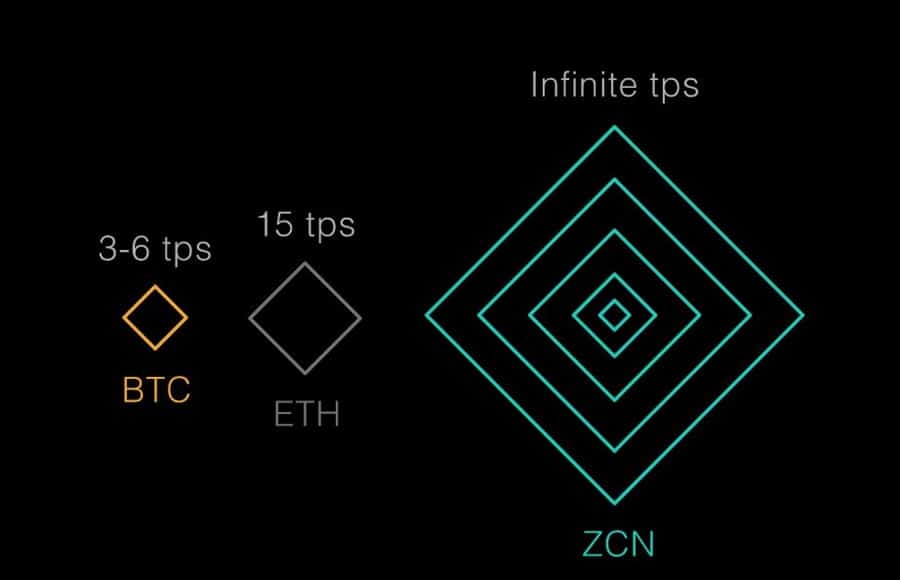 There will be no limits to how far 0Chain can scale. Image via 0Chain.net
There will be no limits to how far 0Chain can scale. Image via 0Chain.net 0Chain addresses scalability issues in two ways. One is by storing data off-chain, avoiding the congestion issues that can arise from having too much data being stored and accessed from the blockchain. In addition, 0Chain is separating this data storage from the tasks of reaching consensus and from block storage. You can learn more from the 0Chain Storage whitepaper.
Energy Waste
The traditional proof-of-work consensus used by Bitcoin and many other blockchains to reach consensus and create new blocks is very energy intensive. This makes the process very expensive as well, and tends to centralize mining operations since specialized equipment is required to participate in mining. This centralization goes against the principles of decentralization, which are one of the cornerstones of blockchain technology.
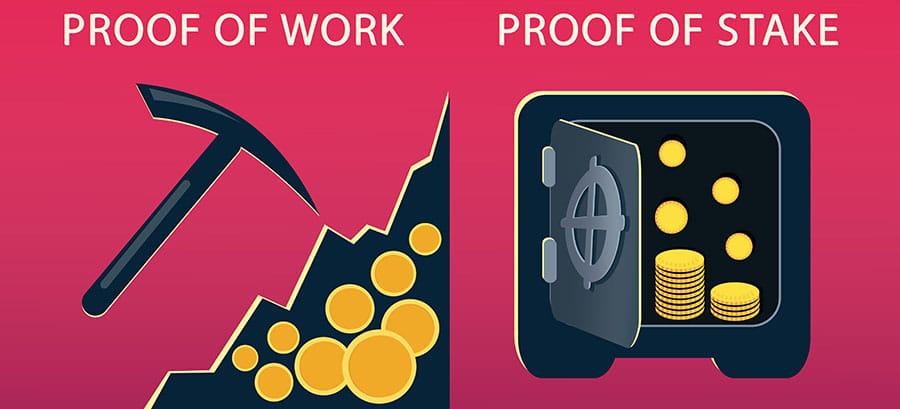 PoW mining is very expensive compared with PoS consensus. Image via Shutterstock
PoW mining is very expensive compared with PoS consensus. Image via Shutterstock 0Chain avoids the excessive use of energy in creating consensus and mining blocks by using a proof-of-stake consensus mechanism that extends on the work of the previously created Dfinity protocol. In addition to using far less energy, the 0Chain consensus also provides fast finality in the creation of blocks. You can read more in the 0Chain Consensus whitepaper.
Resource Scaling
We’ve seen from other blockchains what can happen as the need for resources climbs. Extremely slow performance and excessive network costs are the result. Ethereum is a perfect example. It implements scripts that constantly monitor how users store, utilize, and compute data on the blockchain.
In order to limit this network usage Ethereum has implemented gas fees. As a result network costs have been inflated as more and more applications are running on the Ethereum network. One method for avoiding gas costs is to have applications run offline, however this is impractical when considering IoT devices that need to remain online at all times.
At current gas rates a typical IoT device might burn through nearly a quarter of a million dollars in gas costs annually, which is simply unacceptable.
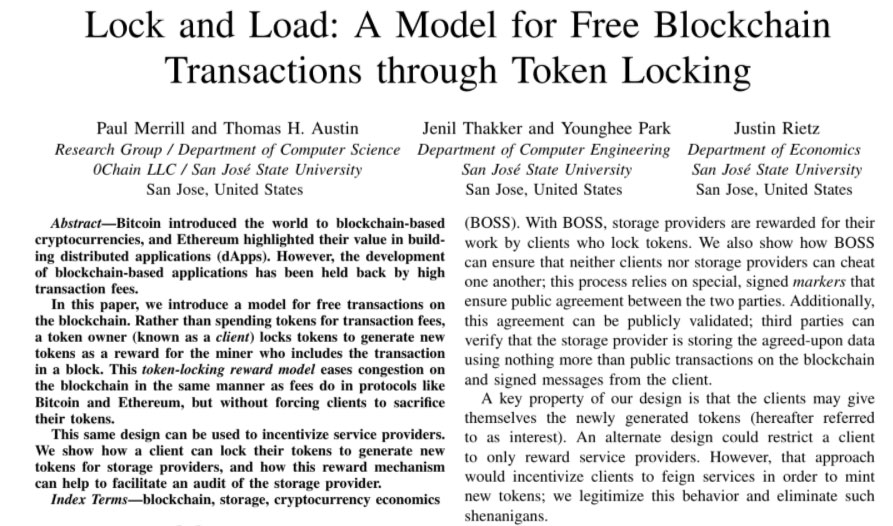 Token Locking yields free transactions. Fascinating! Image via 0Chain.net
Token Locking yields free transactions. Fascinating! Image via 0Chain.net 0Chain is addressing this issue by creating free transactions through a process called “token locking.” Rather than spending tokens for transaction fees, a token owner (known as a client) locks tokens to generate new tokens as a reward for the miner who includes the transaction in a block.
This token-locking reward model eases congestion on the blockchain in the same manner as fees do in protocols like Bitcoin and Ethereum, but without forcing clients to sacrifice their tokens. Learn more about this unique model in the 0Chain Token Reward Protocol whitepaper.
Forking
We’ve seen forking affect several blockchains, with the most notable being the many forks of Bitcoin. These forks occur as the blockchains need to add new code to add new features, but the entire community may not be in agreement over what features to add and which to leave off the blockchain. When a blockchain splits it lowers community involvement and can also cause the value of the blockchain tokens to plunge.
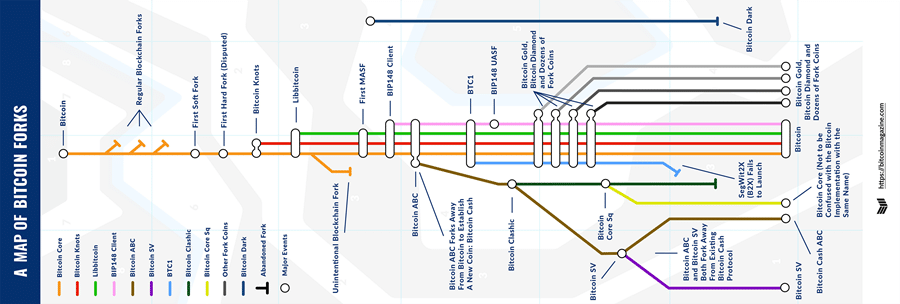 All these forks are not good for a blockchains. Image via VisualCapitalist.com
All these forks are not good for a blockchains. Image via VisualCapitalist.com 0Chain is addressing this forking problem with simple ping-ping governance with indefinite rounds of Yes/No voting to a proposal. It is presumed this will prevent last block attacks and hard forks. You can learn more by reading the 0Chain Governance Protocol whitepaper
Inflation and Volatility
Cryptocurrencies are notorious in their volatility, with prices fluctuating back and forth at a sometimes astonishing rate. In addition, many cryptocurrency prices are heavily influenced by outside forces, and in some cases downright manipulation.
 Captivating reading explaining ZCN token economics. Image via 0Chain.net
Captivating reading explaining ZCN token economics. Image via 0Chain.net 0Chain is addressing this issue through an Economic Protocol that has set the value of its native ZCN token through purely mathematical means. Therefore the value of ZCN is totally intrinsic and is affected by the amount of data being stored on the network, and the number of users and tokens staked. A write-up called “The Equilibrium Price of 0Chain Token” by two professors from Imperial College London explains very well how the system works.
The 0Chain Vision
0Chain has the enterprise market as its target, and with partnerships already in place with Oracle, Amazon Web Services, Coresite, and Cogent they are well on their way. That’s because 0Chain has successfully created a blockchain built from the ground up that delivers fast finality, thousands of transactions per second, and free transactions without sacrificing the security and decentralization offered by blockchain technology.
The solutions provided by 0Chain allow for decentralized storage of data using blockchain technology and the native ZCN token. This is expected to disrupt enterprise cloud-based storage once 0Chain is able to launch their main net. There are several areas under development that are relevant to enterprise usage and wide adoption of the technology. These include:
- support for Blockchain as a Service (BaaS);
- required customization;
- support for decentralized storage (dStorage).
Organizations and businesses who wish to securely store data can buy and lock up the required number of ZCN tokens to do so. Once the contracted storage period is up the business has the choice of selling the tokens, holding them for later use, or repurposing them for other storage needs.
While the upfront cost of purchasing the tokens is higher, this approach does away with monthly charges for cloud storage. In fact, if the ZCN token appreciates in value the business will make a profit at the end of the storage period.
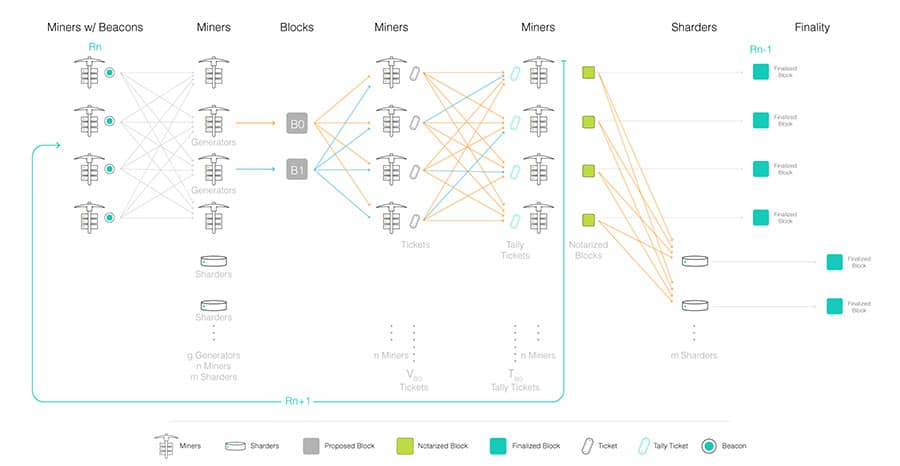 The Mining Network on 0Chain. Image via 0Chain
The Mining Network on 0Chain. Image via 0Chain All this means 0Chain is well positioned to compete with traditional cloud storage companies, and with other blockchain companies targeting enterprise users. In addition, 0Chain has the capacity to integrate enterprise software on both public and private chains, while also allowing the enterprise to store their data securely on-chain with as much or greater speed and reliability when compared with existing cloud-storage solutions.
This is already a reality as the partnerships 0Chain has already forged lets them begin work with enterprise clients to create solutions and move existing infrastructure to 0Chain.
dStorage
dStorage is the decentralized storage platform created by 0Chain to provide users with unparalleled security, auditability, performance and availability. Users are able to store and backup data knowing that it will be completely private and nearly impossible for hackers to breach, and that every action is immediately and immutably stored on the blockchain.
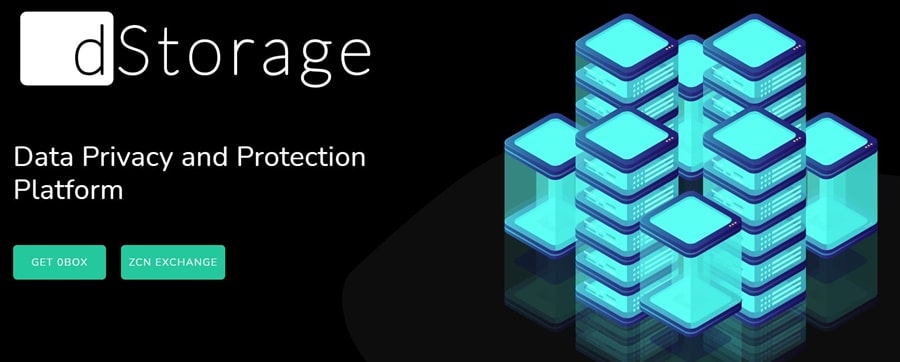 The data privacy and protection platform developed by 0Chain. Image via 0Chain.net dStorage has the following features:
The data privacy and protection platform developed by 0Chain. Image via 0Chain.net dStorage has the following features:- Nearly impossible to breach;
- Faster to uploads and downloads for faster data storage and recovery;
- Very high availability;
- Lower cost than traditional cloud-based storage.
How dStorage works
The dStorage platform splits any stored files into several shards, encrypts each individual shard, and then sends each shard to different servers for storage. Each of these servers has its own cryptographic key, making it impossible to access the data unless you have possession of the keys.
Users require a subset of shards in order to recover the stored data, and any hacker would need a subset of all the keys, not just a single key. This distribution also means several servers could fail and the data could be recovered with the subset of shards. Performance in dStorage is greatly enhanced by streaming the data in parallel to the servers, and data expansion for resilience is far more efficient than with plain old replication.
Security Enhancements
Security enhancements provided by distributed ledger technology protocols are probably the most important consideration for any enterprise. By using 0Chain to host enterprise software tools (with BaaS), the potential single point of failure that plagues enterprise databases is removed. Data in 0Chain is encrypted, replicated across the network, and stored across multiple servers.
With 0Chain even if AWS goes down enterprises will still be able to retrieve their data and the network remains lively. Also, even if the enterprise has its own proprietary servers compromised, the data remains retrievable, and the solutions hosted on-chain remain lively.
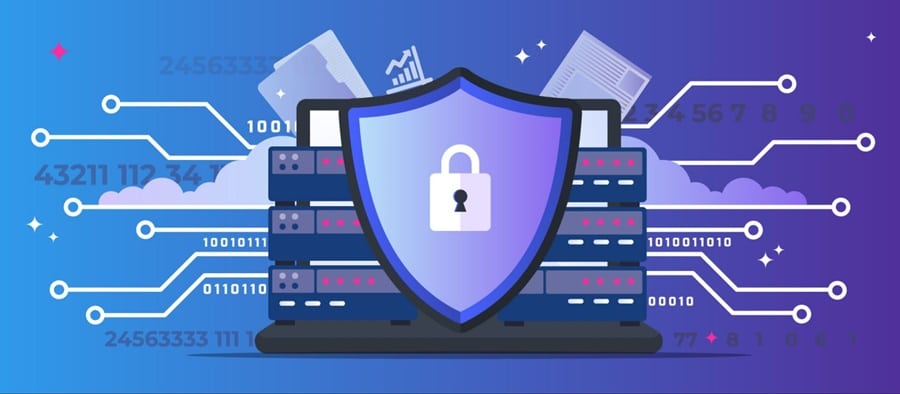 Few things are more important to the enterprise than security. Image via Pixelplex.io
Few things are more important to the enterprise than security. Image via Pixelplex.io With so many firewall hacks leading to compromised data, enterprises have been looking for a better solution to keep their data and networks secure. A DLT solution such as 0Chain is one solution for securing enterprise data and software systems. Not only will it provide increase decentralization and security, but it also increases transparency and provides immutability to any transactions.
Auditability
Enterprise users can also take advantage of Auditability as a Service (AaaS) to help them meet their needs for data access, security, and compliance. With AaaS, enterprises are able to immutably store all transactional data for any of their systems.
By mirroring transactional data to the blockchain the enterprise is able to access the data and conduct audits without having any impact on existing systems or impact any customers. The AaaS system can be deployed on both public and private environments and leverages the optimized performance provided by 0Chain.
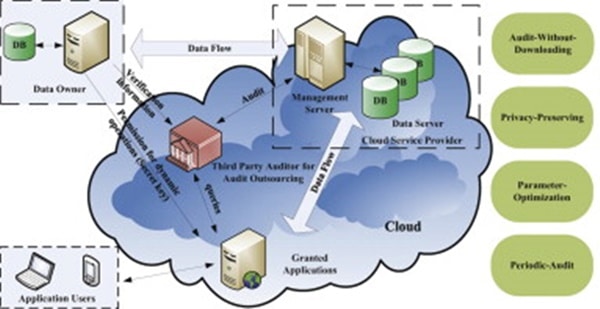 Part of security for the enterprise user is auditability of data and transactions. Image via ScienceDirect.com
Part of security for the enterprise user is auditability of data and transactions. Image via ScienceDirect.com It also leverages the inherent strength of the blockchain platform, which is the ability to access an immutable ledger in real-time without any fear of inaccurate, manipulated, or compromised data. Businesses which choose to integrate their Enterprise Resource Planning systems with 0Chain will realize enhanced accountability and transparency as a result of each transaction being stored as an immutable public record.
In such an environment an enterprise is able to rapidly build and deploy the tools that allow them to query data effectively, while owning and controlling their data for monetization or other purposes.
Other Enterprise Use Cases
While security and auditability are key features that will bring enterprise adoption, there are many other applications and tools that can benefit enterprise users of 0Chain.
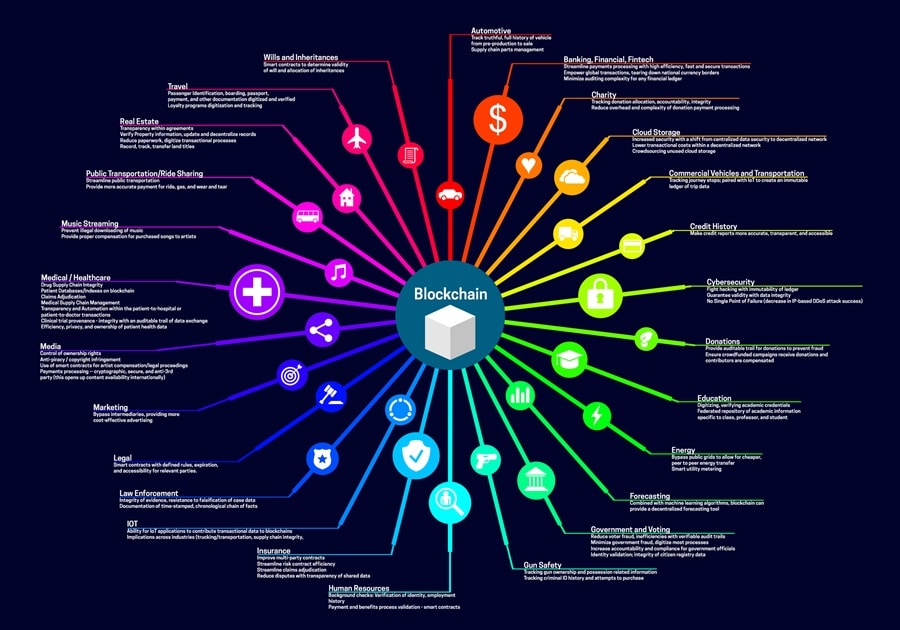 Some of the many uses the blockchain can be put to. Image via Medium.com
Some of the many uses the blockchain can be put to. Image via Medium.comFrom this growing list of applications each enterprise is able to choose which products might be improved by adding them to an immutable ledger through cryptographic means. Already there are so many different tools and resources available that enterprise companies use to provide solutions, collaborate, and educate, and adding these to a blockchain solution can make them more secure, faster, and more effective.
0Chain Products
0Chain is already rolling out a number of products that enhance the dStorage platform, and that can provide enterprise users with significant benefits. Below are the products already available:
0Stor
0stor is configurable, secure dStorage with private sharing.
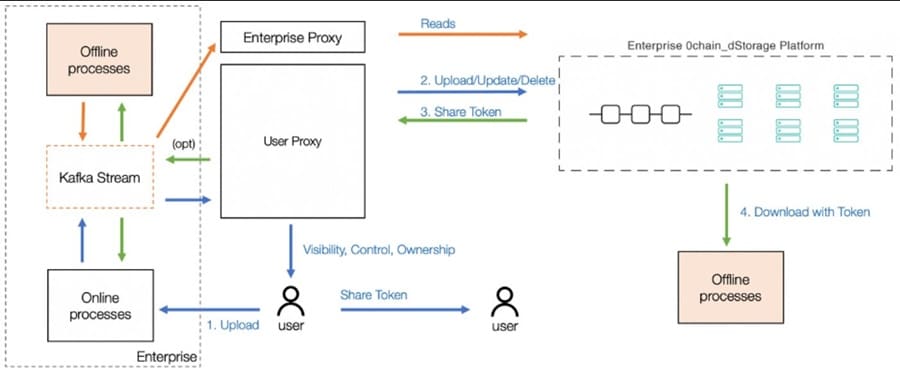 The process used by Ostor. Image via Oracle Cloudmarketplace.
The process used by Ostor. Image via Oracle Cloudmarketplace. As noted by Senior Director of Oracle Blockchain Product Management Mark Rakhmilevich in a recent article on the Oracle blog “0Stor Data Protection Platform with Oracle Blockchain Platform solve the challenge of private data storage with access auditing that is a cornerstone of many privacy initiatives, such as GDPR in Europe and CCPA in California.
Transparency and immutability of access records is an important confidence-builder for users and can be a critical factor in any audits or lawsuits. 0Stor demarcated storage is a powerful solution for data privacy protection, and it can now be extended to provide blockchain anchored access records using Oracle blockchain.”
0Stor Private
0stor Private can reduce the risk of any data or privacy breach even further. With 0stor Private:
- User owns & controls encryption key
- There is clear demarcation, reducing the risk for Joint Controllers
- Build trust between customers, partners, and employees.
- Protect against internal breach
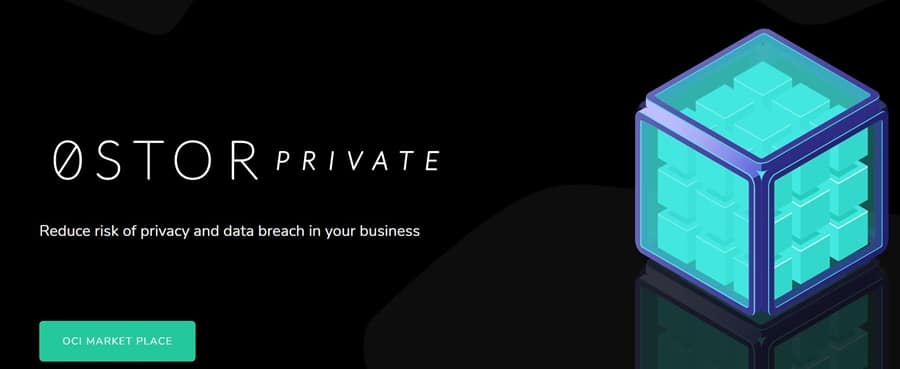
0stor Private is included as a part of the Oracle blockchain and is available from the Oracle marketplace here.
0Box
0box is the recently released mobile application that provides private file sharing and anonymity with no emails or logins required. Available for both iOS and Android operating systems it allows anyone to share files privately and anonymously through push notifications. It comes with constant breach protection through continuous unbiased challenges and has complete transparency.
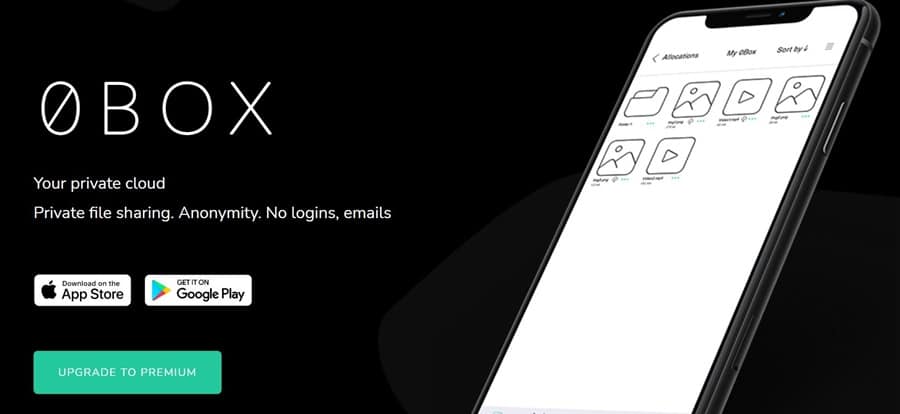 0Box private and anonymous - Beats Dropbox hands down. Image via 0Chain.net
0Box private and anonymous - Beats Dropbox hands down. Image via 0Chain.net With 0box there’s no need for logins or emails. 0box is the decentralized, privatized, and anonymous alternative to centralized solutions like Dropbox. Simply upload to a file that you can easily share with anyone.
0Wallet
The wallet you’ll want to securely store your ZCN tokens, lock or stake them, and earn rewards. The 0wallet features split key 2FA security that allows a user to install and run the same wallet from both a mobile device and a laptop using a generated split key.
 Lock & Earn, Stake & Earn, Split key 2FA Security. Image via 0Chain.net
Lock & Earn, Stake & Earn, Split key 2FA Security. Image via 0Chain.net You can download and test the 0wallet on their site.
0Chain Partnerships
0Chain has been working extremely hard for the past several years, spending thousands of hours building and testing code, writing custom software solutions to get ahead of competitors, and operating with as much agility as you might expect from a start-up in its first years of development.
At the same time they have also been working tirelessly to create new partnerships in the enterprise niche which will help bootstrap adoption once the main net 0Chain launches in the first quarter of 2021.
The partnerships that have been forged with AWS and Oracle have been crucially important in giving 0Chain credibility with the skeptical enterprise users. By being recognized as a partner with these well established cloud-based storage providers 0Chain gets access to their large and varied customer base, allowing them to begin conversations and create more trust in blockchain solutions.
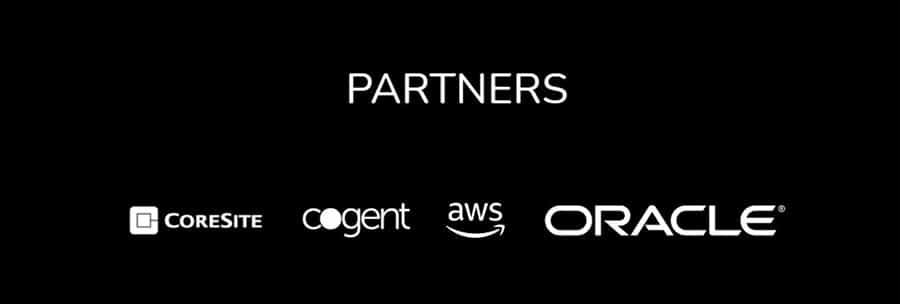 0Chain has an incredibly strong group of partners already. Image via 0Chain.net
0Chain has an incredibly strong group of partners already. Image via 0Chain.net Enterprise users are very cautious, and have concerns that range from security and availability to compliance and auditability. Addressing these concerns at an early stage will benefit 0Chain greatly as it works to grow.
In order to build lasting demand for 0Chain solutions among enterprise users the partnerships with the likes of Oracle and AWS have been immensely useful. These are exactly the partnerships that give the credibility to 0Chain, and are what enterprise CIOs and VPs of IT expect to see before investing time in an initial meeting or a pilot test of the dStorage platform.
Better still, each new enterprise customer can open many other doors. The best prospects often come from referrals by one CIO to another, opening doors that otherwise might remain shut for years. And as each door opens the skepticism over blockchain technology is eroded just a bit more, and projects like 0Chain gain a bit more credibility.
You also have the recent announcement by Fetch that they will be partnering with 0Chain. This will allow Fetch.ai to scale all of their autonomous agent functionalities by using 0chain's unique data storage solutions. This will also give Fetch a unique angle as they will be the only AI company to use a decentralised storage solution (as opposed to Amazon cloud etc).
The 0Chain Team
The 0Chain team is headed by two visionary PhD holders leading a world-class team across many disciplines including cryptography, distributed computing and cloud infrastructure.
 The 0Chain co-founders. Image via 0Chain.net
The 0Chain co-founders. Image via 0Chain.net Saswata Basu is the founder and CEO of 0Chain and a visionary entrepreneur with over 20 years experience in artificial intelligence, internet of things, blockchain technologies, cloud technologies and wireless technologies. He holds both an MS and a PhD from UCLA and has previously worked for Intel, GuruHubb, Harris, Nortel, Aviat, and Energous.
Thomas Austin is the co-founder and CTO of 0Chain, with extensive experience in programming language security and malware analysis. He holds a PhD in Computer Science from UC Santa Cruz, and has previously worked for Mozilla and CloudFlare.
The 0Chain Token (ZCN)
ZCN is the native token of 0Chain and it is used for storage and tied to the data stored in the system. It can also be locked or staked in order to generate interest for holders. The value of ZCN is completely mathematically driven, and is based on the amount of data being stored on the network. Initially this will be driven by 0box usage, but later enterprise usage is expected to create further value in the token.
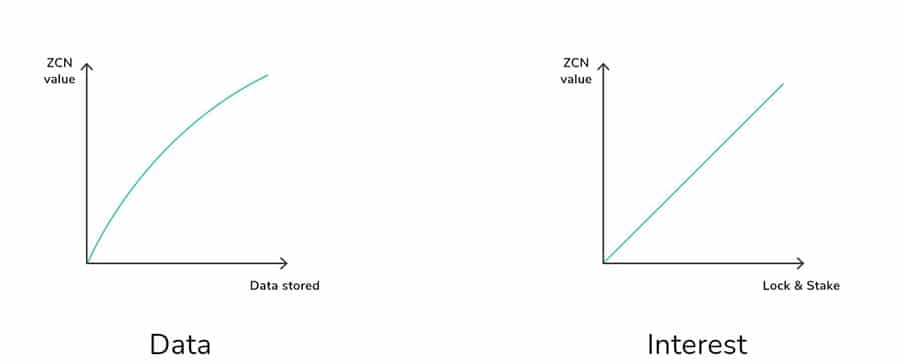 The only token who value is directly proportional to network usage. Image via 0Chain.net
The only token who value is directly proportional to network usage. Image via 0Chain.net While the ZCN token is currently the 488th largest in terms of market cap, its price has performed well in 2020. In August 2020 the price moved as high as $0.45, although that remains shy of the early highs above $0.60 reached when the token first began trading in July 2018.
Still, price has been on the rise again in late 2020, as proponents of the project are anticipating a main net launch in the first quarter of 2021. That would almost certainly spur more gains for the token, and if it can begin to gain adoption the increased usage of the storage capabilities will also help boost the token price in a virtuous cycle.
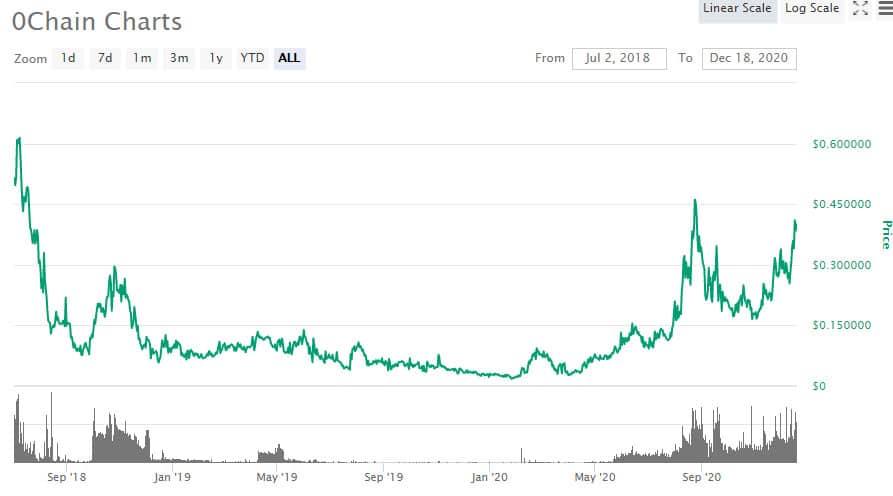 Like most cryptocurrencies 0Chain has seen its share of volatility. Image via Coinmarketcap.com
Like most cryptocurrencies 0Chain has seen its share of volatility. Image via Coinmarketcap.com Currently ZCN is not well supported by exchanges. It is available as a trading pair with ETH at Bilaxy, and with WETH at Uniswap. Coinmarketcap.com shows it as paired with USD at Bitfinex, but the volume is extremely low. It also shows an ETH pairing at IDEX, but there is no price or volume data.
In Conclusion
0Chain has an ambitious goal, and has been working at it tirelessly since its inception. Even as interest in the project waned following the early days the team continued working towards their vision, creating new applications and forging important partnerships with AWS and Oracle, among others.
This hard work is looking ready to pay off as we head into 2021, with the project recently releasing a number of tools (oBox and oWallet) that could help increase adoption, and as a result boost the ZCN token price.
Also just over the horizon is the launch of the project main net, which could significantly increase adoption by building increased credibility from enterprise companies. Indeed the adoption by the enterprise firms being targeted by the project will likely be the biggest hurdle 0Chain will face in the near future. These large enterprise operations are notoriously slow and cautious, and the adoption of a new platform is not something taken lightly.
0Chain has been called a long shot before, even by us, and while it remains a long shot, it does look more promising now than at any other time in its history. We think this is definitely a project worth watching, not only for its focus on enterprise users, but because of the economic model being used that promises to increase the token price as the amount of data stored increases. That’s intriguing and could prove to be extremely profitable for early adopters.
We’re also going to be watching the potential for 0Chain to be used as a media server platform as initial tests look like it could be more efficient than any other solution being considered. If so it could become the decentralized competitor of YouTube, with greater speed and efficiency and without restrictions for users or creators.
Yes, it is very interesting times ahead for 0Chain if we aren’t mistaken.



